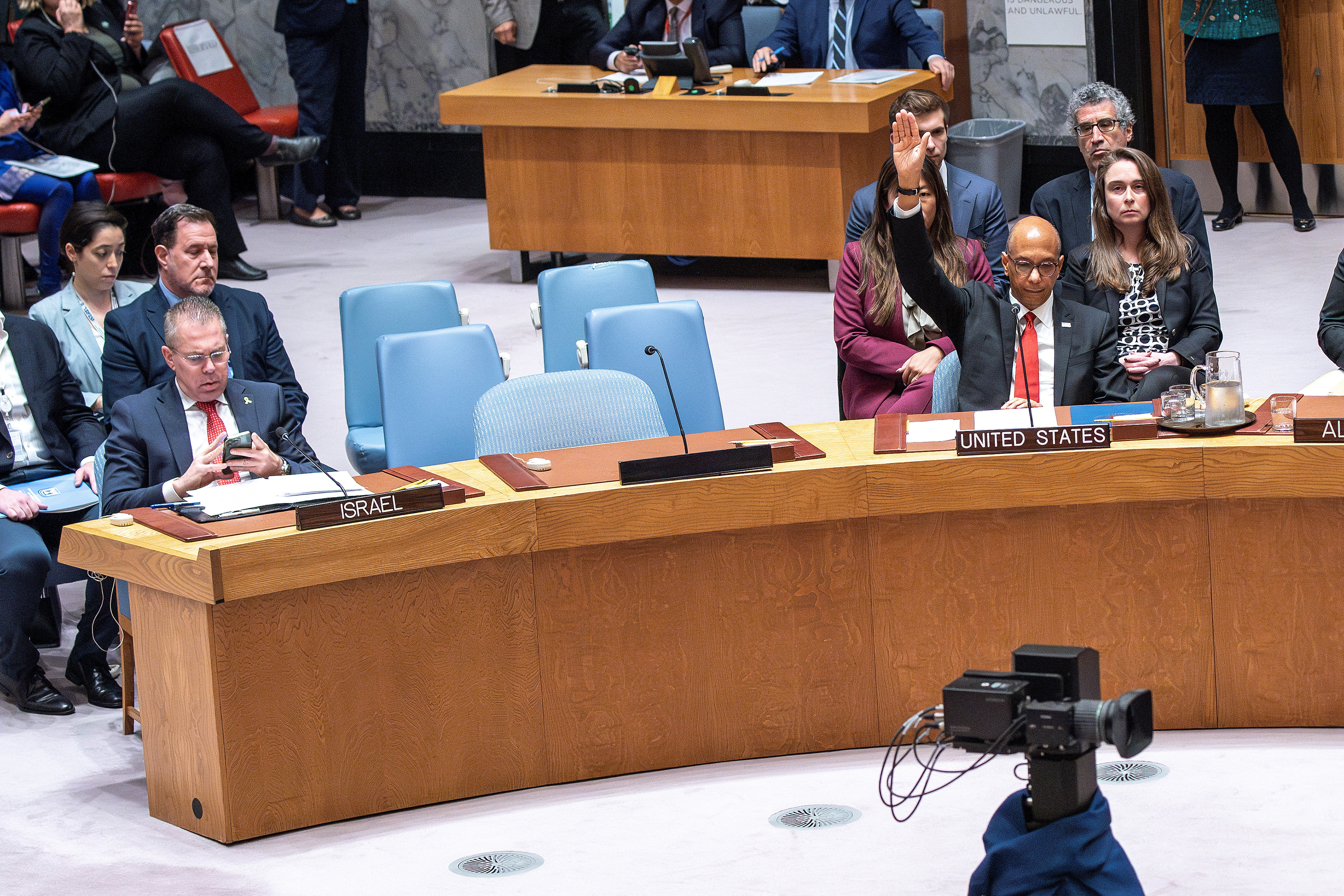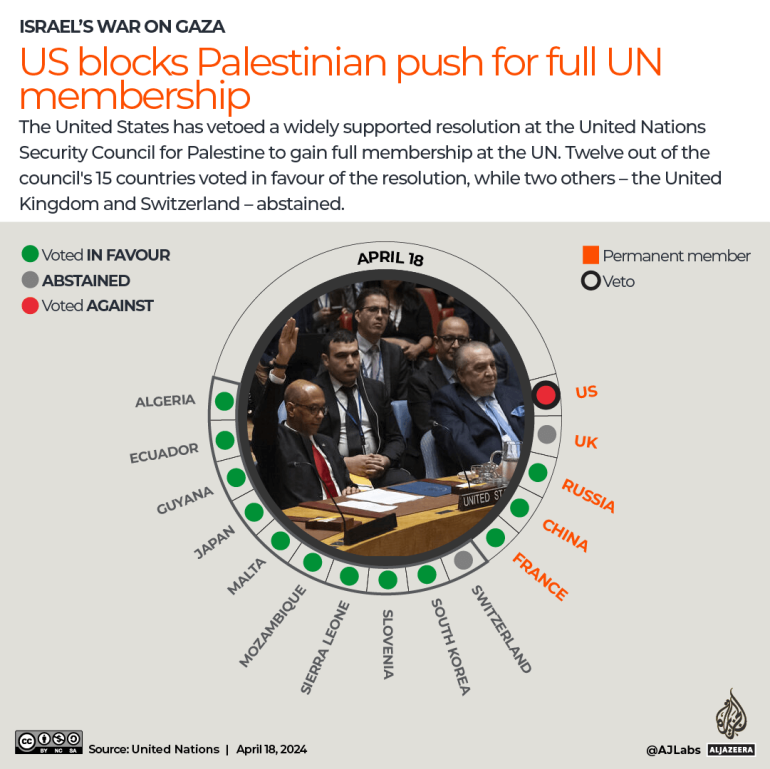
The United States has vetoed a widely supported resolution at the UN Security Council (UNSC) that would have paved the way for the state of Palestine to gain full membership at the United Nations.
Twelve countries voted in favour of the resolution, which was brought for a vote during an hours-long Security Council session in New York on Thursday, while two others – Britain and Switzerland – abstained.

After vetoing the measure, the US deputy envoy to the UN, Robert Wood, said Washington believes there is no other path to Palestinian statehood than through negotiations between Israelis and Palestinians.
“We also have long been clear that premature actions here in New York, even with the best intentions, will not achieve statehood for the Palestinian people,” Wood said.
The resolution was widely expected to fail, as the US – Israel’s staunchest ally – holds veto power at the Security Council and had opposed its passage.
The vote comes more than six months into Israel’s bombardment of the Gaza Strip, which has killed more than 33,000 Palestinians and plunged the coastal enclave into a humanitarian catastrophe.
Al Jazeera’s senior political analyst Marwan Bishara said the US veto demonstrated that Washington has a “my way or the highway” policy with regard to Palestinians.
“Palestine could only be a country the way the United States sees it, or Israel sees it, only at the time that it’s suitable to the United States and within the geopolitics and the global interest of the United States,” Bishara said.
The US, he added, is sacrificing the “freedom of Palestinian people for egotistical and narrow interests of the United States and Israel”.
The state of Palestine currently is a non-member observer at the UN. But an application to become a full UN member needs to be approved by the Security Council and then at least two-thirds of the General Assembly.
Before the vote on Thursday afternoon, Ziad Abu Amr, the UN special representative for the state of Palestine, had appealed for support.
“We are still longing to practice our right to self-determination, to live in freedom, security and peace in an independent state similar to other countries around the world,” Abu Amr told the council.
Palestinians, he added, “made and continue to make great sacrifices to achieve this goal”.
Abu Amr also dismissed claims that the resolution would imperil political negotiations and prospects for peace.
“To those who say that recognising the Palestinian state must happen through negotiations and not through a UN resolution, we say: ‘How was the State of Israel established? Wasn’t that through a UN resolution, which was Resolution 181?'” Abu Amr said.
“This resolution will not be an alternative to negotiations and to resolving pending issues. It will grant hope to Palestinians for an independent state after this hope dissipated,” he added.
“We hope you will give us the opportunity to become an integral part of the international community that is working to achieve international peace and security.”
Israeli ambassador to the UN, Gilad Erdan, used his address to the Security Council to accuse the body of being politicised. He also described the resolution as a “prize to [the] terrorists” involved in the October 7 attack by the Palestinian group Hamas, which governs Gaza.
“If this resolution passes – God forbid – this should no longer be known as the Security Council but as the ‘terror’ council,” he said. “The only thing that a forced unilateral recognition of a Palestinian state will do is to make any future negotiation almost impossible.”
In addition, Erdan called the Palestinian Authority (PA) a “genocide-loving entity that doesn’t deserve any status” in the UN, which requires new applicants to be “peace-loving” nations.
He further argued that the PA has no authority over Gaza and some parts of the West Bank. “So who is the UN going to recognise? Who is going to be in charge?” he asked.
“The UN is not committed to multilateralism. Sadly, it is now committed to multi-terrorism,” he continued. “Today the mask has finally fallen. The UNSC has exposed itself.”
Erdan slammed the UN for voting on a “destructive and immoral” resolution at a time when confrontations between Israel and Iran were at risk of escalating.
Regional tensions, Gaza war
Iran unleashed a barrage of missiles and drones against Israel over the weekend, after an attack on its consulate in Damascus on April 1.
Israeli officials have not said when or where they would retaliate, but the country’s military chief has vowed a response.
UN Secretary-General Antonio Guterres opened Thursday’s Security Council meeting by warning that spiralling tensions over the war in Gaza and Iran’s attack on Israel could evolve into a “full-scale regional conflict”.
“The Middle East is on a precipice. Recent days have seen a perilous escalation – in words and deeds,” Guterres said.
“One miscalculation, one miscommunication, one mistake, could lead to the unthinkable – a full-scale regional conflict that would be devastating for all involved,” he explained, calling on all parties to exercise “maximum restraint”.
Guterres condemned both the consulate attack and the flurry of drones, saying that the latter constituted a “serious escalation”.
“It is high time to end the bloody cycle of retaliation,” he said. “It is high time to stop.”







